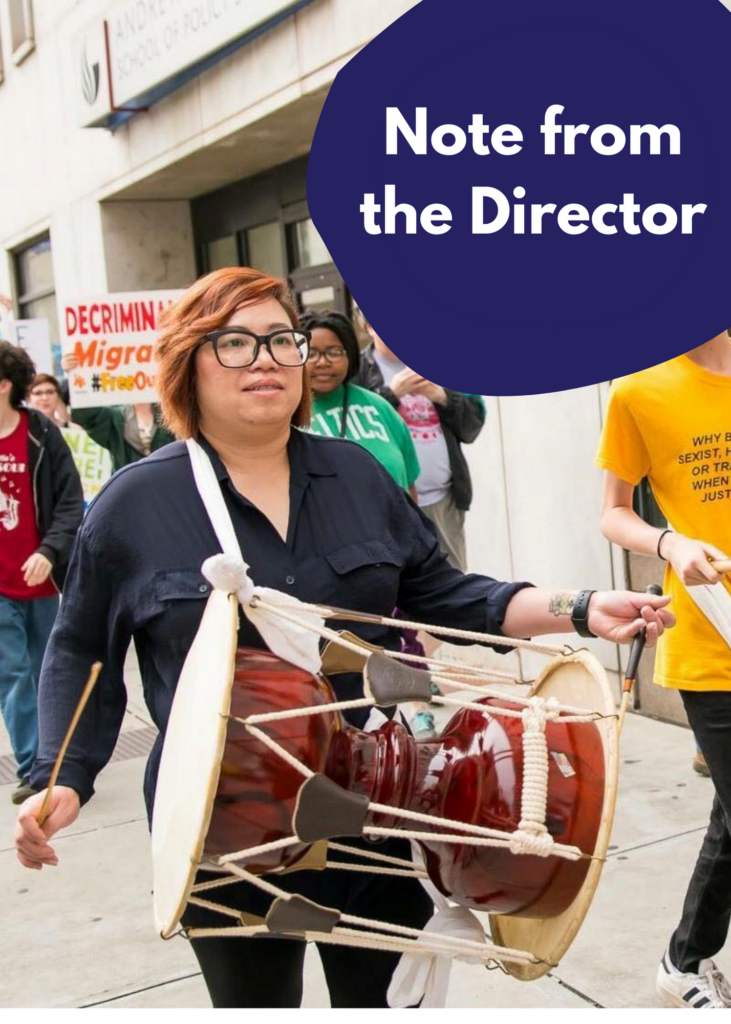
Hi Friend,
Last week was Earth Day and I’ve been thinking a lot about how the climate crisis is affecting our families, our heath, and our communities. Certain politicians, the wealthy, and corporations refuse to take action on the climate crisis that they created and continue to worsen. It’s up to us to demand big change from the people who don’t want to accept responsibility.
We have to fight for green jobs for the people most affected by the climate crisis – people of color, women, and low-income earners – to improve the safety and sustainability of our housing and environment. Along with good, green-infrastructure jobs, we need policies that support stable, well-paying jobs in sectors like child care, elder care, and teaching. Sign our pledge to fight for climate justice and we’ll keep you up to date with action you can take.
In Solidarity,
Leng Leng Chancey

Spotlight
April is Sexual Assault Awareness Month! We’re highlighting how Ending Workplace Sexual Harassment is Economic Justice with a blog from 9to5 State Director Mica Whitfield in partnership with the National Sexual Violence Resource Center.
More than two years into the COVID-19 pandemic, workers face a new wave of sexual harassment both online and in person. When women, especially low-inome and workers of color, experience sexual harassment in the workplace there are short- and long-term economic impacts. Working together to end sexual harassment in the workplace and create stronger protections for survivors means a future where we can thrive in the workplace.
Highlights

COLORADO
How has the climate crisis in Colorado affected you and your family? We want to know! Take the survey to share and take action for a greener, more just Colorado!

GEORGIA
We wrapped up all of the exciting things that happened during this year’s Georgia legislative session on Facebook live. Tune in to hear about the highlights, lowlights and how you can engage in future legislative work.

WISCONSIN
On April 12, Milwaukee County passed 8 weeks of paid parental leave for employees of the county. Wisconsin State Director Christina Thor shared remarks about the urgent need for family sustainability.
What We’re Reading
Black women turn to doulas as maternal mortality crisis deepens
April 11-17 was Black Maternal Health Week, highlighting the health disparities in pregnancy and reproductive health among the Black community, including that Black women are more likely to die in childbirth than other races. Black women are choosing to hire doulas to help advocate for and protect them during birth.
Inflation is hurting women at the grocery store. Some are eating less in order to feed their families
The price of everything is rising faster than our wages, forcing some women to cut back and skip meals to afford food for their families. Low-income people are more likely to be spending a larger portion of their income on the items with the highest inflation — housing, groceries and utilities.
Pregnancy becomes a more vulnerable time with climate change
The climate crisis is affecting pregnancies in many ways from air quality to displacement from a climate-driven disaster. Communities of color are at greater risk of these dangers due to historical redlining, lack of access to air conditioning, or job type.
‘Sitting on a time bomb’: Mobile home residents at risk in red-hot housing market
The rate of women returning to work was much lower than menMobile homes can provide affordable housing and stability for families but big companies are buying up land and raising rents across the country, putting homeowners at risk.

